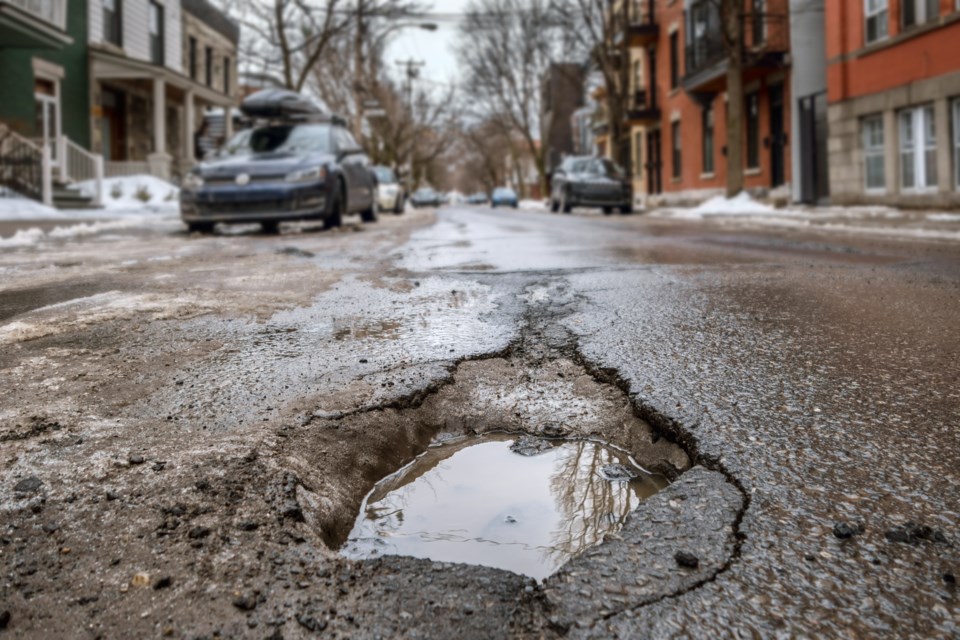Tired of seeing drivers smash into potholes, a Nova Scotia man took matters into his own hands Monday and filled in a pesky crater with gravel, according to the Chronicle Herald.
Although 22-year-old John McCue said he has received a warning from the RCMP in Stellarton, N.S., he has been shovelling gravel from the side of the road and filling in potholes on a local highway, the Chronicle Herald reported.
And some local drivers have praised him. Others have given him tips, McCue told the newspaper.
But the Nova Scotia Department of Transportation and Infrastructure Renewal is warning residents not to take part in do-it-yourself repair work.
“We understand the frustration that potholes cause this time of year but we strongly encourage motorists to contact [us] rather than taking matters into their own hands,” Marla MacInnis, a spokesperson for the department, said.
“This is very dangerous without the proper safety measures in place.”
McCue isn’t the first person to pick up a shovel hoping to fix neglected potholes.
In 2016, Montreal comedian Tony Riccio said he was tired of constantly driving into a large pothole located on his street for years so he bought a bag of topsoil for 99 cents, grabbed a shovel and made a video demonstrating how easy it is to fill potholes. He then filled the crater with dirt and smoothed it out with a shovel.
He said the patchwork didn’t last long, but it was more about making a statement to the City of Montreal.
“The minute we left, they filled up the pothole, and three years later, the rest of my street has many potholes, but that one particular one is still fixed,” he said when Global News asked for an update on the pothole.
“You can eat off of it; it does not crack. Clearly, they were embarrassed.”
Officials from the city of Montreal told Global News that by-laws do not allow someone to “soil, alter, damage or destroy pavement. Leaving debris or dirt on the pavement is also forbidden.”
Officials said if a citizen were to fill a pothole themselves, they could “hinder the quality of the future permanent pavement.” Fines start at $250 for a first offence, and can range to up to $2,000 for multiple offences.
Some Canadians have even turned to planting gardens in unattended potholes.
In August 2018, a group of Toronto residents who were fed up with the pesky pothole on their street started planting a tomato garden inside it instead.
“The city has kind of neglected it, and now someone has taken advantage and did something good with it,” Toronto resident Samantha Steeves told Global News.
The pothole problem isn’t just a reality in Canada.
In Portland, a group of self-declared road-care anarchists hit the streets in 2017 and started patching potholes on city streets using a mending technique called cold patching.
But Dylan Rivera, a spokesman for the Portland Bureau of Transportation, told Citylab that filling potholes of your own accord was illegal.
“It’s not safe or legal for people to fill potholes on streets that are maintained by the city,” Rivera said. “They run the risk of being injured in a traffic crash. They also run the risk of being held personally liable if someone were to be injured by the pothole they attempted to fix.”
Pothole woes across Canada
The fluctuations between warm and cool temperatures in the early spring are what causes potholes to form on streets.
They are created when water seeps through the top layer of asphalt by way of cracks in the road. The water then freezes, expands, pushes the pavement upward and dries. This leaves a hole in the road. When cars drive over that void, it breaks up the asphalt and creates a pothole.
It’s a problem that cities across Canada deal with. Since the beginning of January in Toronto, more than 12,165 potholes have been repaired by the city, and it costs approximately $25 to fix each one.
But fixing that pothole yourself will cost you. The City of Toronto said filling a pothole is considered to be altering a public roadway, which would require a permit. If you decide to fill in the pothole anyway, you could be fined, the city said.
In Halifax, city crews have repaired more than 1,600 potholes since November 2018. But, like Toronto, the city said repairing a pothole requires a permit and could result in a fine if done without proper permission.
What will happen if I fix a pothole?
Patching up a pothole on city streets is probably not a great idea, according to Toronto-based lawyer Jordan Donich.
“People can sue for almost anything. The problem … is that the likely risk of being involved in potential liability far outweighs any temporary benefit with filling the pothole,” he said.
Filing in a pothole takes some skill, training and quality materials. If the work is not complete or done correctly then the probability of injury could be higher, or the city might have to undo the work and you could incur an additional expense to fix it, Donich explained.
“At the end of the day, it’s probably not worth it,” he said.
— Global News
With files from Global News’ Erica Vella



